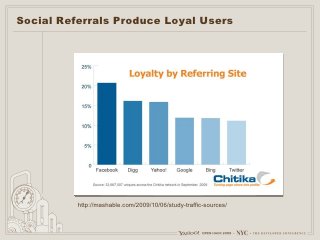
MARLBOROUGH, MA, 9/25/2009 – Online ad network Chitika this week broke down over 123 million impressions across their 60,000+ publisher network and determined that the overwhelming dominance of search engines is facing little, if any, threat from social networks. Despite predictions that social media will replace search engines as Internet users’ primary method of finding information online, a breakdown of the numbers shows that isn’t the case.
MARLBOROUGH, MA, 9/25/2009 – Online ad network Chitika this week broke down over 123 million impressions across their 60,000+ publisher network and determined that the overwhelming dominance of search engines is facing little, if any, threat from social networks. Despite predictions that social media will replace search engines as Internet users’ primary method of finding information online, a breakdown of the numbers shows that isn’t the case.

Social Media No Threat To Search Engine Dominance
Google, Search Engines Leading The Way
Chitika broke down the top 65 referral sites across their network for seven days in September, and compared the results to the same data from seven days in July. Unsurprisingly, in September Google leads the world with 76.13% of all referrals, followed by Yahoo (7.34%), Bing (5.20%), AOL (1.24%) and Ask (0.84%) in that order. As a genre, search engines as a whole encompassed 97.82% of all referrals, and search engines accounted for all of the top 5 individual sources.
Social Media Far Behind, Led by StumbleUpon
The top non-search referrer is StumbleUpon, classified in this study as a social network, with 0.27% of all referrals. Facebook, arguably the highest-profile social network, ranked 17th in September with 0.06%. Microblogging social network Twitter came in at 47th in with 0.02%. Social networks accounted for 0.55% of all referrals, less than the #5 search engine Ask.com sent by itself.

Changes Over Time: Bing Dropping, Twitterers Become Link-Blind
Looking at September’s numbers vs. July, it appears that several interesting things are happening: for one, Twitter users appear to be becoming link-blind. Since July, Twitter has plummeted from 24th on the list with 0.05% of referrals to its current spot, 44th, with 0.02%. At the same time, Microsoft’s much-heralded decision engine Bing has lost market share, both overall and within the search engine ecosystem. Bing in July held 5.84% of all referrals (6.35% of the search engine market). In September, that number has dropped to 5.20% overall (5.68% of search engine traffic).
As for genres of incoming links, between July and September search has seen a minor increase in its dominance, while social media has increased its share of referrals from 0.47% to 0.55%. The increases seem to have come at the expense of traffic from video sites and Internet Service Providers, both of which saw their share drop.
In all, it would appear that while social media is increasing in its ability to generate outbound traffic, those increases are not at the expense of search engines, which continue to increase their referral dominance.
About Chitika
Chitika, Inc. is an online advertising network and research firm, leading the way in intent-based advertising and search engine insights. With over 60,000 sites and 2 billion monthly impressions, the Chitika network is the pulse of the online world.
- How To Retain SEO Ranking After A Redesign - February 22, 2023
- Ultimate Guide: How to Write Brand Names - February 17, 2023
- 10 Best Practices for Using Video in Your Email Marketing Campaigns - February 8, 2023





Go2toppanel
The author provides a fresh perspective on the debate between social media and search engines in terms of their influence on website traffic. I appreciate how the author’s argument is supported by data and logical reasoning. The article presents a positive outlook for website owners and digital marketers, as it suggests that social media can actually complement search engines rather than pose a threat to them.